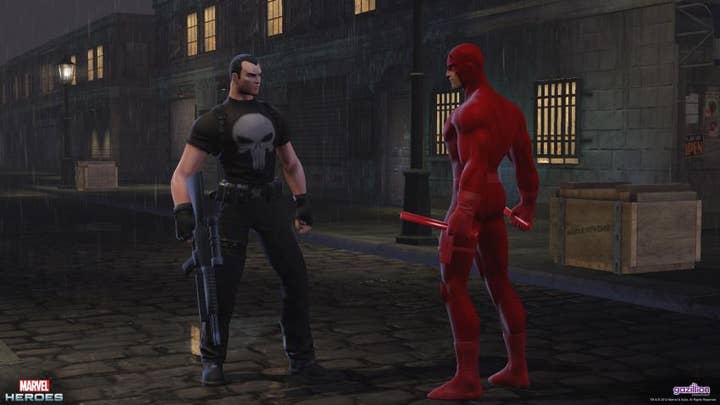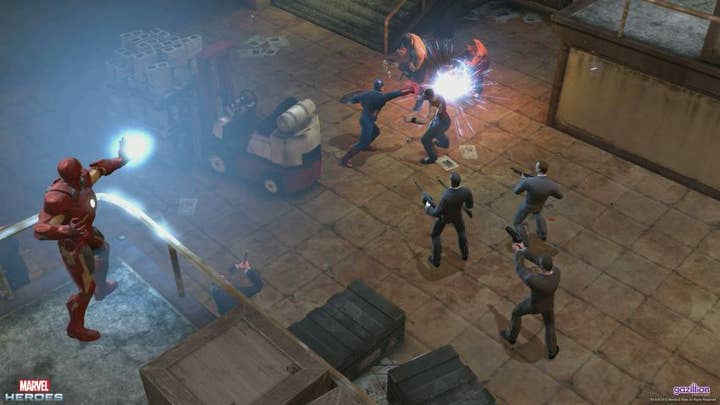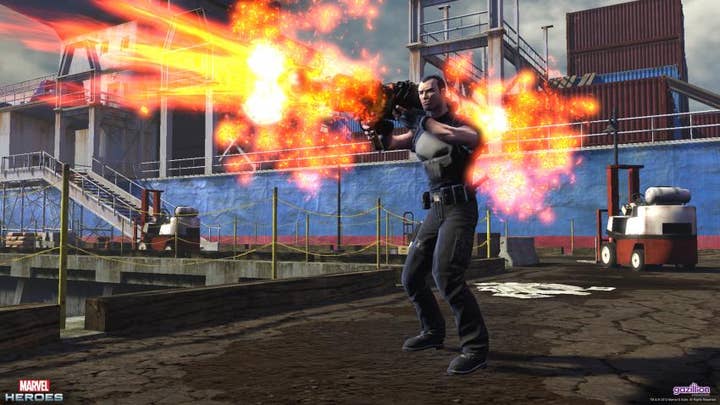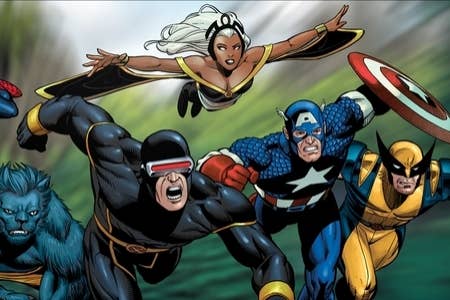Marvel Heroes: No Nickel and Dime Operation
Six years in the making, David Brevik is promising a true free-to-play MMO for comic book fans
Just as superheroes never really die, so Marvel's massively multiplayer online universe refuses to lay down in the dirt despite numerous false starts and rebrands. Through Cryptic, Microsoft and now Gazillion, Marvel's dream of a huge online world with thousands of pop-culture heroes smashing the living crap out of each other has survived through sheer determination. The game originally mooted in 2006 is still not out, and since then even the mighty Marvel has been bought out by Disney, but whether you like it or not, this game is getting released.
"Everybody is saying 'we're free to play' but they aren't. From the consumer standpoint it's hard to understand what is free-to-play and what isn't"
But it's not just Marvel and its online universe that has gone through changes in those six years. Developer Gazillion was originally started by John Romero as a studio concentrating on educational games, then it had desires to be an MMO powerhouse - now it's still concentrated on MMOs but focused on free-to-play.
"We've had really fantastic investors that really believe in us and I hope they get rewarded in the end," says David Brevik, president of Gazillion and previously seven-year veteran of Blizzard. "They believe in the business model and what we're doing."
Faith in the business has kept it afloat through layoffs, restructure and the cancellation of big hopes like LEGO Universe, and it is faith in the comic book IP that attracted Brevik to Gazillion. "They already had the Marvel licence. That's what lured me there in the first place," he says.

With such a long gestation period for Marvel Heroes (nee Marvel Universe Online, formerly Marvel Universe), Gazillion has been fortunate to see the fall of subscriptions and the rise of free-to-play in the MMO space. There will be no climb down from subscriptions for Marvel Heroes, it's free-to-play from the off. And Brevik wants that to be clear from day-one, without the muddy definitions that have arisen as companies try to redefine 'free-to-play' in their own terms.
"It's not just busy, it's confusing," says Brevik of the F2P market. "Everybody is saying 'we're free to play' but they aren't, it's a small percentage of the game or something like that. From the consumer standpoint it's hard to understand what is free-to-play and what isn't, it feels like a buzz word at this point and it's hard to tell.
"We designed this game as completely free-to-play from the ground up. We wanted to make the highest quality free-to-play game that had ever been made. I think we're hitting that target. We're creating a triple-A quality game that has deep gameplay, graphics are state of the art because we're using Unreal Engine to render, and we aren't just a little bit free. We're completely free.
"Social gaming is another method of free-to-play and it's very in-your-face. That's not our strategy at all"
"Trying to message that to people has been a bit of a challenge simply because people don't really understand what free-to-play can mean with companies using it in very different ways."
How does Brevik get around the suspicions of consumers when they eye the free-to-play label warily?
"We don't," he jokes. "The only thing we can do is prove it, I can talk until the cows come home."
Brevik's experience with and knowledge of massively multiplayer online games is evident, and it's informed the direction that Gazillion is taking with Marvel Heroes. Ultima Online, Everquest and Dark Age of Camelot may have begat the 10 million-user World of Warcraft, but Marvel Heroes is looking to a different breed of multiplayer gaming.

"That's not what an MMO is. MMO doesn't mean 'WoW clone'," he says. "It's a method for a lot of people to play a game together, thousands at a time. Using that as a base to build on and combining that with Diablo is the direction we're taking."
"Social gaming is another method of free-to-play and it's very in-your-face," he adds. "You just get started and then you have to wait an amount of time before you get turns again or you can pay $1 and make it happen now. That's not our strategy at all, we're going very, very differently.
"League of Legends is a great example of a free-to-play game. It's completely free, you don't have access to everything and I think that's the kind of model we're trying to pursue. All the content is free and there are others things that you can buy to enhance your experience but they are completely optional. This isn't a nickel and dime experience we're creating."
The other battle Brevik and Gazillion needs to take on is the fight to convince the audience. Video game fans have a notorious sense of entitlement, as do comic book fans. Combining the two? That's a potential Infinity War.
"Comic books are about two things - story and art. Games are about gameplay," offers Brevik.
"In a lot of ways we have to take liberties with the IP. When they are making a comic book and creating a character they don't think 'how is this going to play in a game?' We have to bend some of the rules of the IP to do the same. To keep the flavour of what they're trying to express, but convert it into something that's actually playable as a game.
"MMO doesn't mean 'WoW clone'"
"I've always been a gameplay first person over everything else. I believe fantastic gameplay is repeatable, you can play it over and over, and that really gives a game life. Playing through a story is a very common experience that people create these days but for me it doesn't have the replayability that I'm looking for."
As a comic book fan himself, the game is in good hands. But he's also got a number of other factors on his side, not least the current popularity of the Marvel brand.
"Especially after the latest Avengers movie, the Marvel IP is riding really high," says Brevik. "I'm hoping we get the word out and capture an audience because we'll create a game that has a depth that people are looking for."

"Things that also help us are having Brian Michael Bendis, a very prolific Marvel comic book writer doing our story. Things like that really tie us to the industry. We feature a lot of comic content, old comic stories that you replay, and that really makes the difference."
The industry doesn't see free-to-play as a buzzword anymore, it's an established part of the business with its own success and failures. But perhaps pop-culture consumers still see it as a novelty, and Brevik hopes Marvel Heroes will demystify it somewhat. He's not in denial of the competition, but he reckons there's a good shot his game will resonate with a sizeable group of genre fans.
"The free-to-play business model is just starting to open up," he offers. "It's proven to be successful in Asia for a long time but in the US and Europe it's just starting to catch on. I don't think there really is as much competition yet.
"There are excellent games that have entered this space and had a big impact. But we are making a very, very different game to all of those. We have Diablo meets Marvel on steroids. I don't think we have as much competition directly where we're aiming, we do in business model, but not the type of experience we're creating. It should stand on its own."

